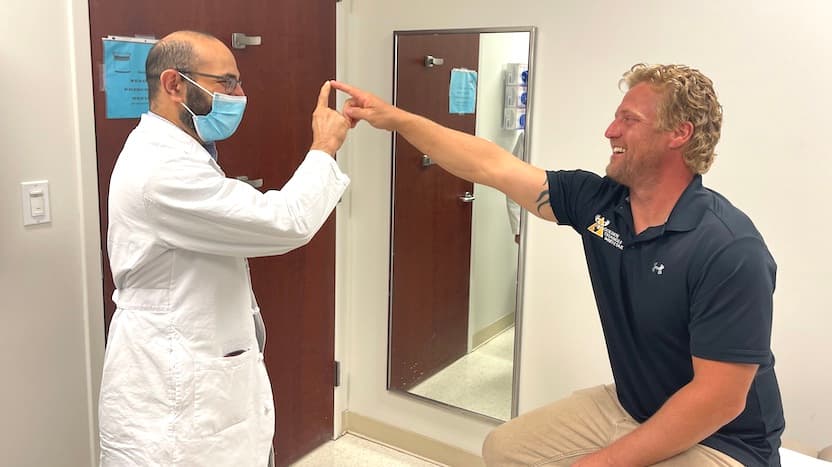Cirugía de ablación con láser da a un padre primerizo con epilepsia control de su vida

Para Kyle Pavlick, de 37 años, cargar a su hijo fue una idea aterradora. Debido a que Kyle sufría ataques espontáneos causados por su epilepsia. Tenía miedo de dejar caer al bebé si aparecía uno de repente.
Además de las frecuentes convulsiones más pequeñas, experimentaría otras más grandes conocidas como epilepsia mayor. Violentas convulsiones musculares durante episodios de epilepsia de gran mal le provocaron hombros dislocados y caídas inesperadas. Terminaría con ojos sanguinolentos, vasos sanguíneos reventados en el pecho y moretones en la cara.
“La ansiedad arruinó mi vida”, dijo. "Estaría fuera de si durante algunos días, adolorido y cansado".
Al crecer, a Kyle le encantaban las actividades al aire libre. La caza y la pesca con su padre, andar en motocross y acampar eran algunas de sus actividades favoritas. En la escuela secundaria, se animó a jugar fútbol y terminó con dos títulos de campeonato estatal y una beca completa para la Universidad de Tennessee en Martin.
Pero los médicos creen que un episodio de meningitis temprano en la vida, junto con varias conmociones cerebrales, pueden haber desencadenado epilepsia cuando tenía 29 años, lo que eventualmente detuvo las actividades que amaba. Después de presenciar una convulsión en 2016, su novia y ahora esposa, Nicole, se convirtió en su principal cuidadora y apenas se apartaba de su lado. Kyle probó varios medicamentos para ayudar a controlar las convulsiones, pero ninguno parecía funcionar.
“Fue horrible”, dijo Nicole. “Apenas dormía. Cantaba una canción o hacía un ruido similar a los sonidos que hacía durante sus convulsiones de gran mal y yo entraba en modo de lucha o huida de inmediato”.
Después de aproximadamente siete años de lidiar con las convulsiones de gran mal, Kyle y Nicole decidieron tener un bebé. James nació en junio de 2021. La llegada del bebé, junto con una aterradora convulsión de 40 minutos que llevó a Kyle al hospital cuatro meses después, Kyle inició la búsqueda de tratamiento alternativo para su epilepsia.
Naoum (Norm) Issa, MD, PhD, Profesor Asociado de Neurología y Director de Investigación de Epilepsia en UChicago Medicine, se reunió con Kyle y le expuso varias opciones de tratamiento. Finalmente, el Dr. Issa recomendó la cirugía de ablación con láser para el complejo caso de Kyle.
El procedimiento mínimamente invasivo implica el uso de datos de diferentes mapas cerebrales para identificar el punto de partida, o foco, de las convulsiones de una persona. Utilizando estos datos, el neurocirujano implanta electrodos directamente en el cerebro. Estos ayudan al equipo de atención determinar donde realizar la cirugía.
Cuando llega el momento de operar, el cirujano hace una pequeña incisión, más pequeña que el diámetro de un bolígrafo, en el cráneo. Usan tecnología láser dirigida para destruir las células responsables de causar las convulsiones.
Detener las convulsiones: mapeo de convulsiones y cirugía de ablación con láser para la epilepsia
Desde su cirugía, realizada en febrero de 2022 por el Director de Medicina Estereotáctica y Neurocirugía Funcional de UChicago, Peter Warnke, MD, Kyle no ha tenido más convulsiones de gran mal.
“Estoy encantado de ver que a Kyle le va tan bien”, dijo el Dr. Issa. “Es muy importante ofrecer un procedimiento como este en el que no fracturamos el cráneo”.
UChicago Medicine ha registrado la mayor cantidad de procedimientos mínimamente invasivos para casos complejos de epilepsia en el área tri-estatal de Wisconsin, Illinois e Indiana. El equipo de epilepsia del sistema de salud también ofrece muchas opciones de tratamiento más allá de la cirugía de ablación con láser.
Ha podido ir a pescar, disfrutar de un tiempo a solas y lo más importante, abrazar a su hijo. Kyle sigue tomando varios medicamentos de mantenimiento para prevenir recaídas, pero el Dr. Issa tiene la esperanza de que algún día pueda dejar de tomarlos por completo.
“el Dr. Issa y todo el equipo cambiaron mi vida”, dijo Kyle. “La cirugía nos ha permitido convertirnos en una familia”.
